October 5, 2020
Armenia, Who?
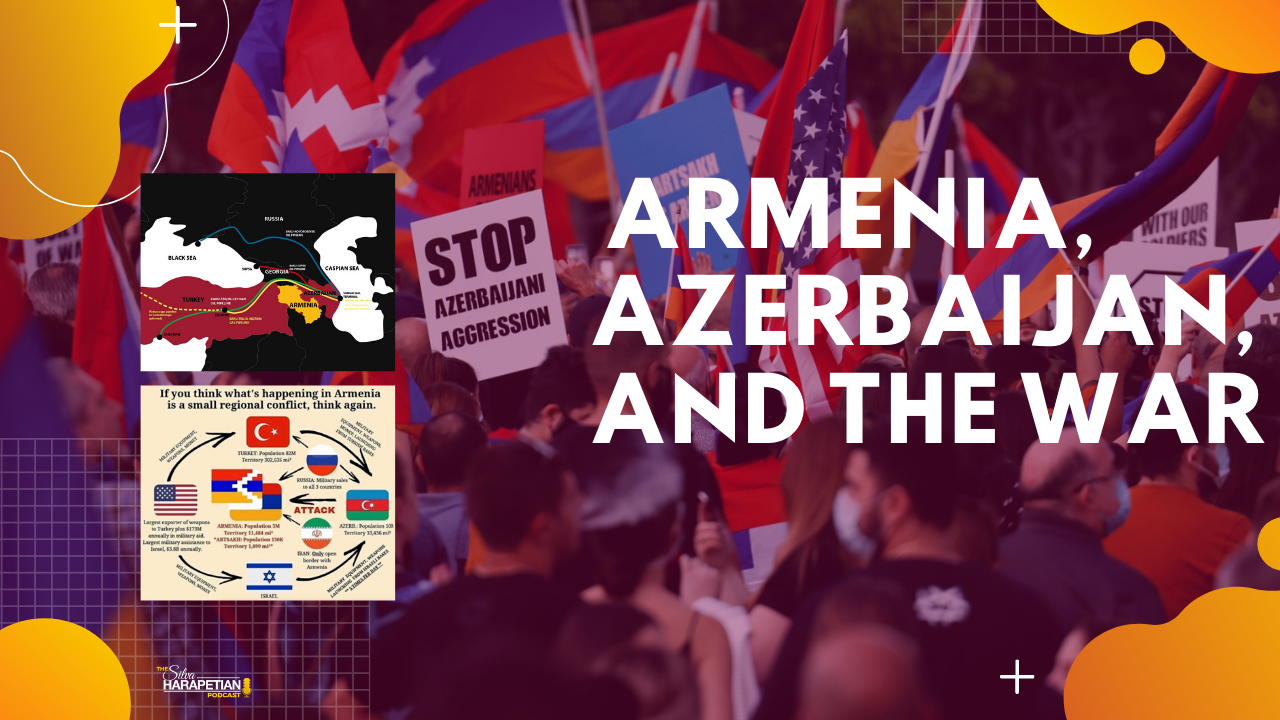
Today, in October of 2020, there is a war in Armenia and Artsakh. It may not be in a region familiar to most. It may not even involve people you care about or know much about. But, What’s happening is not only a humanitarian matter, it has global political and historical implications that impact you and me today and forever.
Why?
Because staying complacent in the face of unjustified aggression will shape the world we live in.
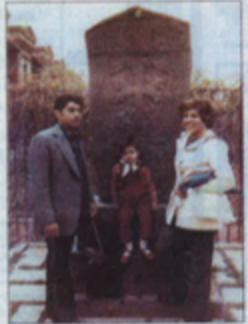
When I was 3-years-old, my parents and I visited my aunt who lived in Armenia. The 10-day vacation left a lasting impression on my young brain and it evoked emotions my young heart would not understand.
Imprinted in my memory are the images of grand churches, some carved into the mountainside, some on the mountaintops, but all old.
Many of the churches were erected in and after the 4th century about the same time Mesrob Mashtos invented the Armenian alphabet. His statues and the Armenian alphabet carved into stones are proudly at display everywhere in Armenia.

While I never returned to Armenia again, there has always been an unexplainable connection with the land and its people, thousands of whom are scattered all over the world. Many are survivors and children of survivors of the 1915 Armenian Genocide. What we all have in common is a bond that makes us proud of our Armenian race, history, heritage, and culture that we strive to keep alive.
My family lineage goes back to Armenia dating back to the 1800s. But, I grew up in Iran where my Armenian ancestors had settled years before the Genocide. Growing up, life seemed normal until the Iranian Revolution and the subsequent Iran/Iraq war that lasted almost a decade. My tween years were spent nail-biting in the dark, nights in bomb shelters, in basements, waiting, and hoping the missiles would miss us. It’s a story much like the one unfolding in Nagorno-Karabakh also known as Artsakh. As the men fight in the front lines, women and children retreat underground to unheated basements, sheltering day and night from the on-going violence.
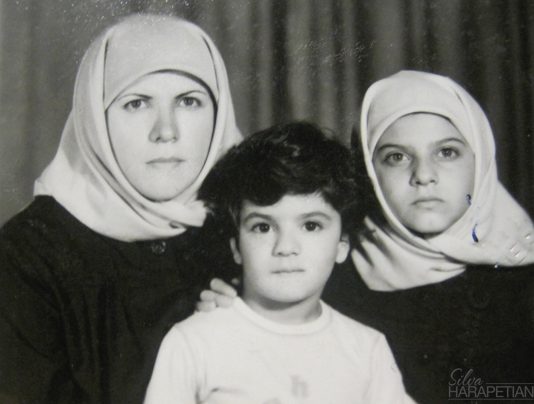
The first 12 years of my life shaped the trajectory of my future. Witnessing such horror ignited a need to fight against injustice and amplify the voices of the unheard. It also awakened the humanitarian in me. I have felt it my responsibility to speak truth to power, essentially dedicating the last 22 years of my life to journalism.
I tell you my story because so many of you have asked to understand what is going on with Armenians around the world and why you should care. As you read this article, I am not going to ask you to take sides. However, I am going to ask you to have an open mind and consider historical facts. Do your research, stay informed, educated, and use the power of your voice and your vote.
Why?
Because history repeats itself. Because when forces in the world think they can get away with it once, then they will repeat their actions and that’s how a global humanitarian problem is perpetuated.
Let me take you back to World War I. More than 3 million Armenians, Assyrians, and Greeks were hung, executed, tortured, and exiled into starvation by the Ottoman Empire. Following a policy of ethnic cleansing, the Ottoman Empire systematically exterminated its Christian Armenian population in the region while the rest of the world was distracted by World War I. Historians and scholars have called it the first Genocide of the 20th century. The word “Genocide” was created expressly to describe that crime. However, at the time, the rest of the world was not paying attention and by the time international powers realized what was happening it was too late. The Ottoman Empire claimed it was “civil war” amidst World War I, and to this day, modern-day Turkey, formerly the Ottoman Empire, continues to deny the atrocities.
Hitler followed the Ottoman Empire’s playbook. He told his generals “Who, after all, speaks today of the annihilation of the Armenians?”
The Holocaust followed.
And then there was Rwanda, Cambodia, Libya, Guatemala, Rohingya. All a small group of unimportant people, dehumanized and targeted because they were different in race, nationality, or religion.
Crimes against humanity transcend borders and nationalities and represent how systemic injustice can be perpetuated even in your country, city, or neighborhood.
Earlier this year, thousands spoke out around the world about the systemic racism, oppression, and injustice inflicted on our brothers and sisters who led the Black Lives Matter movement.
This is why you should care. This is why you should care. Because this fight is about shaping the world in which you and I, and our children and ancestors will live in. A world in which unjustified aggression towards any innocent civilian population is not only not tolerated, but stopped. We need your voice now.
If you have ever met an Armenian or have an Armenian friend you should know that what’s happening has deep and historical roots and it is stirring a lot of intergenerational trauma. (Check on those friends. Let them know you stand with them. Act by contacting your representative or donate.) Watch my interview with a psychotherapist on how to cope with intergenerational trauma.
So, what exactly is going on?
HISTORIC BACKGROUND
Armenia is the world’s very first Christian country.
Artsakh, also known as Nagorno-Karabakh is a South Caucasus territory north of Turkey and Iran. Azerbaijan to its East, Artsakh has been part of Armenia, and inhabited by ancient Armenians, since 150 BC.
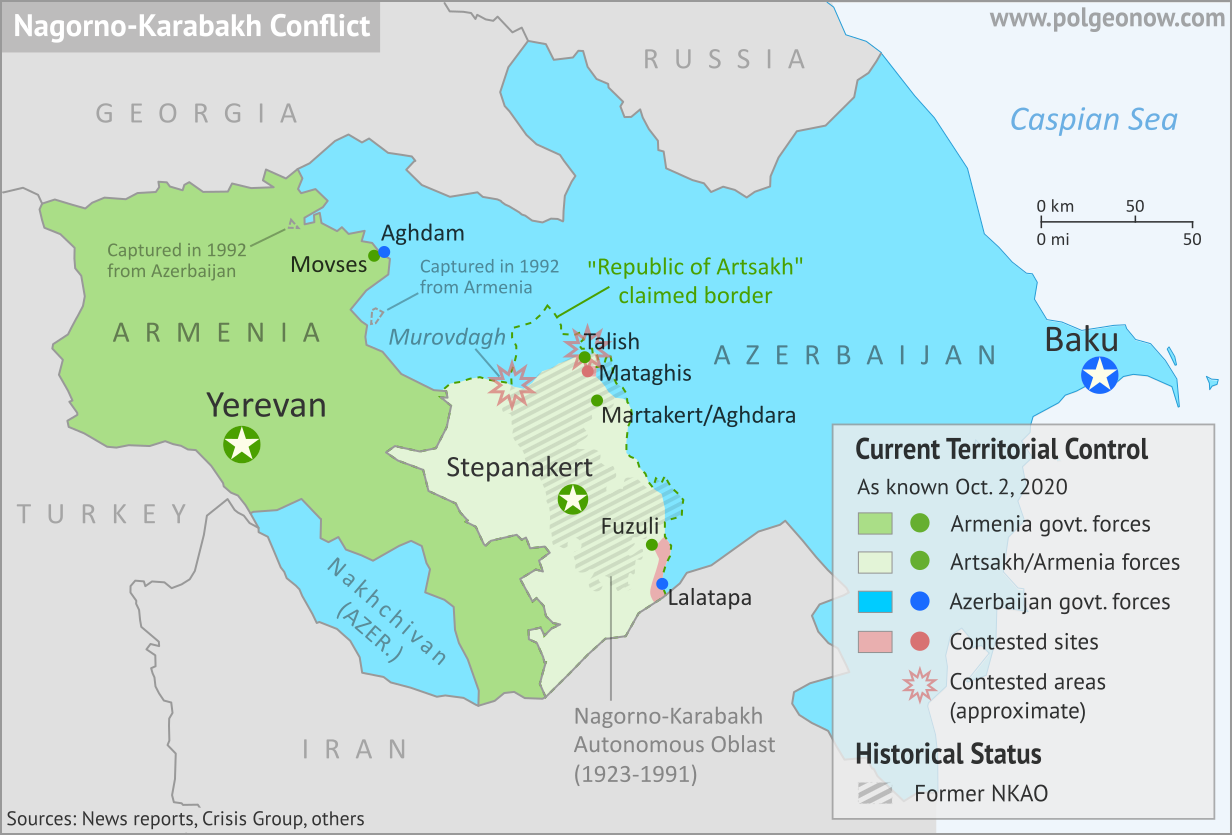
- 1914 – 1918 – Ottoman Empire took over Baku (current capital of Azerbaijan) and created the independent country of Azerbaijan. Ottoman Empire following a policy of ethnic cleansing systematically exterminated its Armenian population in the region. The word “Genocide” was created expressly to describe that crime.
- 1921 – After the Soviet Union took control, its leader Josef Stalin gave Artsakh (Nagorno-Karabakh) to Azerbaijan.
- 1988 – The first violence of the current conflict broke out. Artsakh’s national assembly voted to dissolve its autonomous status and join Armenia.
- 1992-1994 – War over the territory claimed more than 30,000 lives, displaced hundreds of thousands with a Russia-brokered truce.
- Artsakh is a territory that is legally part of Azerbaijan but has been occupied and run by a self-declared government of ethnic Armenians since 1994 backed by Armenia.
- Modern-day Turkey is the former Ottoman Empire.
Decades of negotiations – mediated by three Organization for Security and Co-operation in Europe (OSCE) Minsk Group Co-Chairs representing France, Russia, and the U.S. – have failed to resolve the conflict.
The most current escalation of the attack is exasperated by the fact that Turkey is openly supporting Azerbaijan’s efforts. For Armenians, the involvement of Turkey in backing Azerbaijan has confirmed their view that it is an existential conflict. “We view this as a continuation of the genocide,” said an activist in Artsakh.
On September 27, 2020, Armenia said Azerbaijan’s military violated the ceasefire and bombed civilian settlements in Nagorno-Karabakh and its capital of Stepanakert. In response, Armenia’s defense ministry claimed it downed helicopters and drones. Azerbaijan launched a counteroffensive with tanks, war planes, artillery missiles, and drones — many of which have been aimed at civilians, destroying homes, hospitals and schools.
New York Times reports, “Prime minister of Armenia Nikol Pashinyan spoke by telephone on Thursday with President Trump’s national security adviser, he raised a delicate issue: Why is nothing being done to stop a longtime United States ally, Turkey, from using American-made F-16 jets against ethnic Armenians in a disputed mountain region?”
Pashinyan says the conflict “[is not about territory.] Armenians in the south Caucasus are the last remaining obstacle in the way of Turkish expansion toward the north, the south and the east,” he told the NYT.
Turkish President Tayyip Erdogan called Armenia to end its “occupation” of Azeri territory. In a broadcast in July of 2020, Erdogan said, “we will continue to fulfill this mission which our grandfathers have carried out for centuries in the Caucasus region.”
Azerbaijan president Ilham Aliyev said in a televised statement “Nagorno-Karabakh is our land.” He said, “this is the end. We showed them who we are. We are chasing them like dogs.”
Although Erdogan’s precise goals are uncertain, Prime Minister of Armenia has said, it is using hard power to press Turkish interests across much of the former Ottoman space, including against Russia in Syria and Libya, and against Cyprus, Greece, and Israel in the Eastern Mediterranean.
OUTSIDE PLAYERS
There are so many factors in this conflict, so many interlocking interests, external players, and potential dangers.
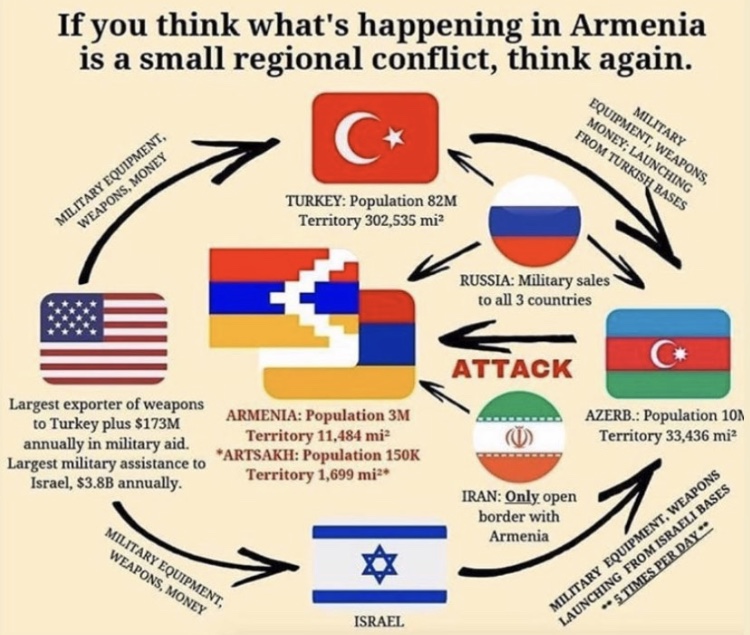
Prime minister, Pashinyan accused Turkey, a member of NATO, is not only providing air support but also recruiting Syrian fighters, “mercenaries and terrorists,” to fight in Azerbaijan’s military for $2,000 a month, a wage many say they have not received.
OIL, MONEY AND HUMAN LIVES
Azerbaijan supplies Turkey with natural gas and crude oil via pipelines, the Baku-Tbilisi-Ceyhan pipeline (BTC). It passes within 10 miles of the Azerbaijan-Armenia border and 30 miles of the conflict zone.
In business since 2005 at a cost of $4 Billion, it is to help the US gain independence from oil from the Persian Gulf.

According to AsiaTimes, the founding stone for BTC is British Petroleum’s (BP’s) which is headquartered in Baku, Azerbaijan. “In 2005, it was estimated that the company invested at least $15 billion in the country (exploration, exploitation, pipeline construction).“
The pipeline ends right next door to the massive American airbase in Incirlik, Turkey. This begs the question if the situation were to get worse, would the US become involved, simply because the US army would find itself in the line of fire?
Russia provides Armenia with security guarantees, but these do not extend to combat zones in Artsakh. Moscow also supplies weapons to both sides.
PLAYING GLOBAL CHESS
While it is in the interest of Western powers to have a strategically positioned dictator in Azerbaijan, it has also raising humanitarian concerns.
Azerbaijan President Ilham Aliyev was elected in what international reporters called a fraudulent election. This is a regime that according to Transparency International ranked 20th out of 168 countries, in the global corruption index in 2017. The president appointed his wife as the Vice President.
It is widely reported that Azerbaijan’s dictator has historically been silencing opposition for decades. Information is being censored and journalists jailed. In fact, in this current war, there are reports of international journalists not being allowed into the country to cover the conflict.
Years of censorship and misinformation by the Azerbaijan government has created a population that has no historical perspective. To no fault of their own they are being fueled by propaganda and untruths.
Just in the past few days, there has been a coordinated propaganda cyber attack on celebrities who have spoken out in support of Armenia. Both Elton John and CardiB took down their social media posts after reporting coordinated online attacks.
The President of Artsakh has said that the “war is not against the people of Azerbaijan. In fact, the people of Azerbaijan suffer from the irresponsible reckless behavior of the Azerbaijani military-political leadership explicitly backed by Turkey.”
No matter where you stand on the issue — it is important to remember that human lives are at stake and there must be accountability for war crimes.
However, considering the global silence, the people who shape world politics seem largely uninterested. UPDATE: Yahoo reports, Canada has suspended weapons sales to Turkey and is investigating the alleged use of military technologies in the conflict.
France, Germany, Italy, the United States, the European Union, and Russia have urged a ceasefire. But, according to reports on the ground, there has been no proactive international mediation.
WHO ARE WE REALLY?
There is a bitter truth: Nobody seems to care. As the Armenian author William Saroyan said, “we are a tribe of unimportant people” from a forgotten land.
Or, are we?
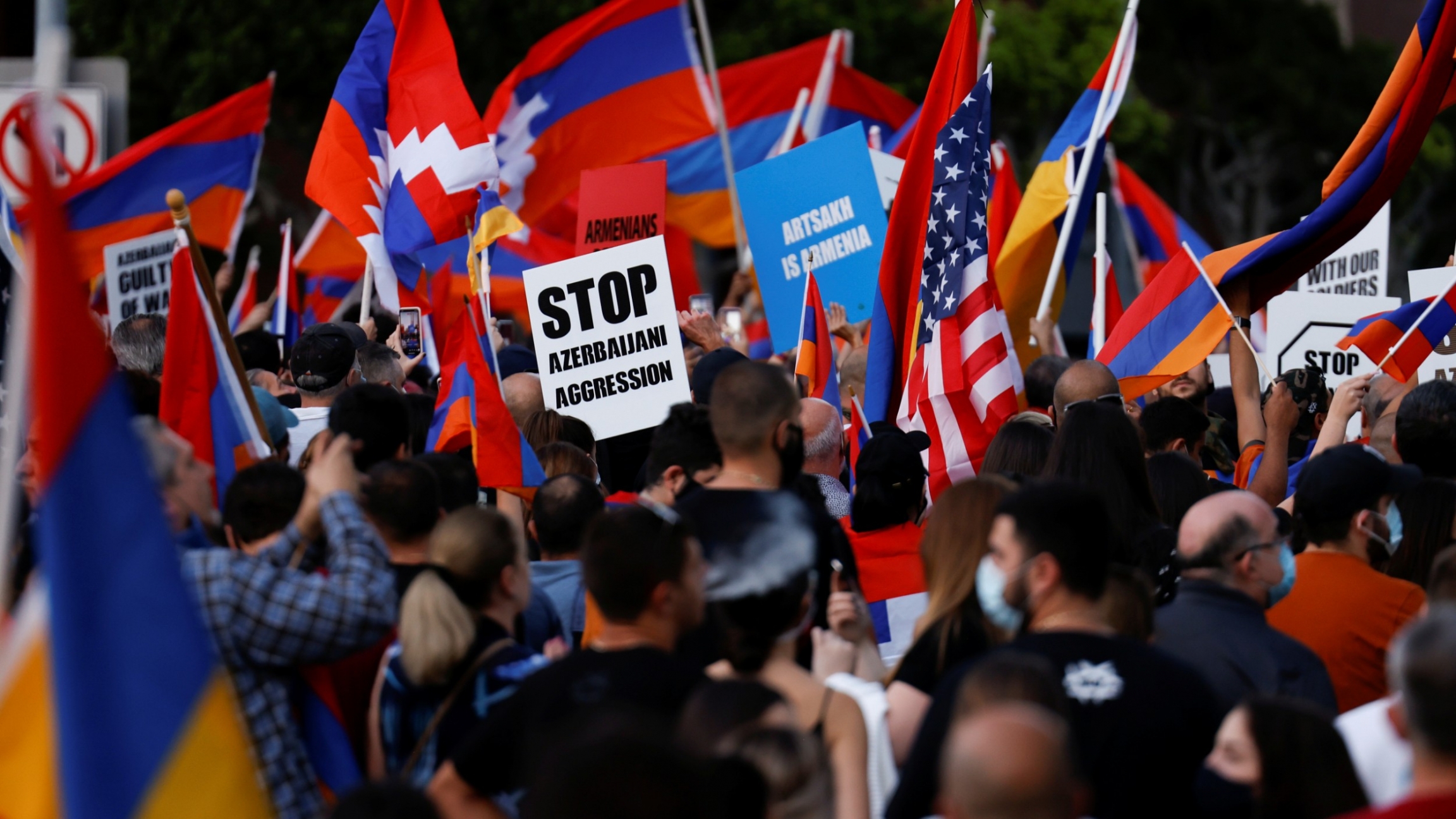
Armenia has a population of about 3 million. But its diaspora, concentrated in the US, with significant hubs in Lebanon, Australia, France and Russia, extends to at least double that size.
Many are survivors of the Genocide. In exile, generations of displaced people have nurtured a resilient national identity, and powerful advocacy and political machine. We have money and voting power.
Since Sunday, members of the Armenian communities across the world have taken action calling their representatives, donating, speaking, posting, publicizing what many call another Turkish attempt at “Genocide.”
Thousands have been peacefully protesting in Los Angeles, Glendale, Burbank, Pasadena, Oakland, San Jose, Fresno, Las Vegas, Utah, Philadelphia, Boston, Detroit, Denver, New York, Utah, and Greece, Canada, Argentina, New Zealand, Australia, Italy, Belgium, Poland, Chili, Uraguay, to name a few.
Many of the protesters — just like me — weren’t even born in the motherland some have they ever been. But, our Armenian roots run deep. We move as though we’re led by the tormented memories of our ancestors and the desperate need to live to fight another day.
We display a unique sense of compassion for humanity. And, despite the atrocities afflicted on our people, we’re still hopeful, have faith, our hearts are open and worn on their sleeves.
At last check, the global Armenian community has raised 70 million dollars and hundreds of thousands of dollars in medical supplies. All bought and shipped to Armenia in a matter of hours.
Social media feeds have been taken over by Armenian students, influencers, celebrities, and everyday ordinary people who have been educating, informing, and demanding that the world break its silence. That our friend with whom we stood in the name of equality and justice join us.
There has been a full-court press on the media — in full transparency, on me as well — demanding that media outlets provide fair and accurate coverage about a small war with global implications.
There have been massive protests in front of the Los Angeles CNN office and closures of two major freeways in as many nights to get news coverage and bring attention to whats going on.
This is war. This is an unfamiliar region. This is a group of small people. But, this is us.
You know us. You work with us. You build with us. You love our loyalty and friendship. You love our hospitality and generosity. You celebrate with us. You read our literature. You dance with us at our weddings and eat xorovatz in our back yard with a side of vodka. You know us. We are peaceful and loving people. But, we can’t do this alone. We need your support.
We are the children and grandchildren of this small tribe of unimportant people still fighting a war but now our voices will rise, music echo in every corner of the world, laugher will become louder, prayers will be answered for no matter where we are in the world — by a click of the mouse — we are creating a new Armenia everywhere every day.
We will not be silenced. Neither should you.
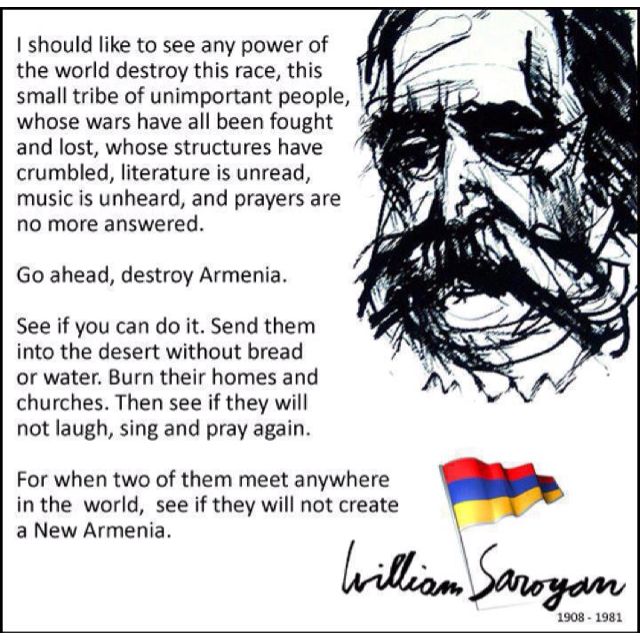
Stay informed! Here are the people you should follow on Instagram and Twitter.
@silvaharapetian
@araksyakarapetyan
@armenianassembly
@electelen
@thearmenianreport
@armeniafund
Updated 10-8-2020